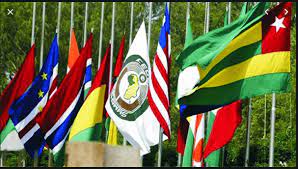Burkina Faso, Mali and Niger will lose out on a number of regional programmes and projects if their withdrawal from Ecowas comes into force, according to the final communiqué of the extraordinary summit of the bloc’s Conference of Heads of State and Government held on 24 February.
The withdrawal of the Alliance of Sahel States (AES) will reduce the size of the Economic Community of West African States (ECOWAS) market, even though being landlocked, Burkina Faso, Mali and Niger account for only 10% of the region’s gross domestic product (GDP).
The regional body said at the end of an extraordinary summit in Abuja on 24 February that intra-community trade could be disrupted, particularly in unprocessed goods such as livestock, fish, plants, agricultural products, minerals and traditional handicrafts, as well as industrial products of Ecowas origin.
As landlocked countries, Mali, Niger and Burkina Faso risk seeing the cost of trade with the rest of the world soar after the break with the sub-regional organisation, the International Monetary Fund (IMF) has warned.
“The negative impact will be felt mainly by the three countries if they leave the Ecowas trading bloc. Leaving the bloc would lead to much more trade friction. These countries are already landlocked and face relatively high transaction costs in trading with the rest of the world. There is a risk that they will face even higher transaction costs, which would be detrimental to these countries,” said Abebe Aemro Selassie, Director of the IMF’s African Department, at a press conference in early February 2024.
The withdrawal of the three member states will also lead to the cancellation or suspension of all Ecowas projects and programmes in Burkina Faso, Mali and Niger worth more than US$500 million.
These regional projects and programmes concern agriculture, food security, pastoralism, regional integration and integration, electricity, etc.
In financial terms, the three countries stand to lose investments from two regional financial institutions, EBID and BOAD. These institutions have “significant exposure” to the Sahel Alliance.
The Ecowas Bank for Investment and Development (EBID), for example, currently has 27 public sector projects and 20 private sector projects totalling around US$321,634,253, while the West African Development Bank (BOAD) has a portfolio in the three countries of over US$33,135,445, or around 22.5% of the bank’s total portfolio in the 15 member states.
At the end of January, Burkina Faso, Mali and Niger announced their withdrawal from Ecowas, accusing the organisation of betraying the ideals on which it was founded.
Faced with these concerns, Burkina Faso’s head of state, Captain Ibrahim Traoré, attempted to play down the impact of the country’s withdrawal from the bloc in mid-February.
“There is less than 5% of economic trade between Ecowas states because everything we import comes from outside the grouping and everything we export goes outside Ecowas,” he said.
DS/te/lb/as/APA


